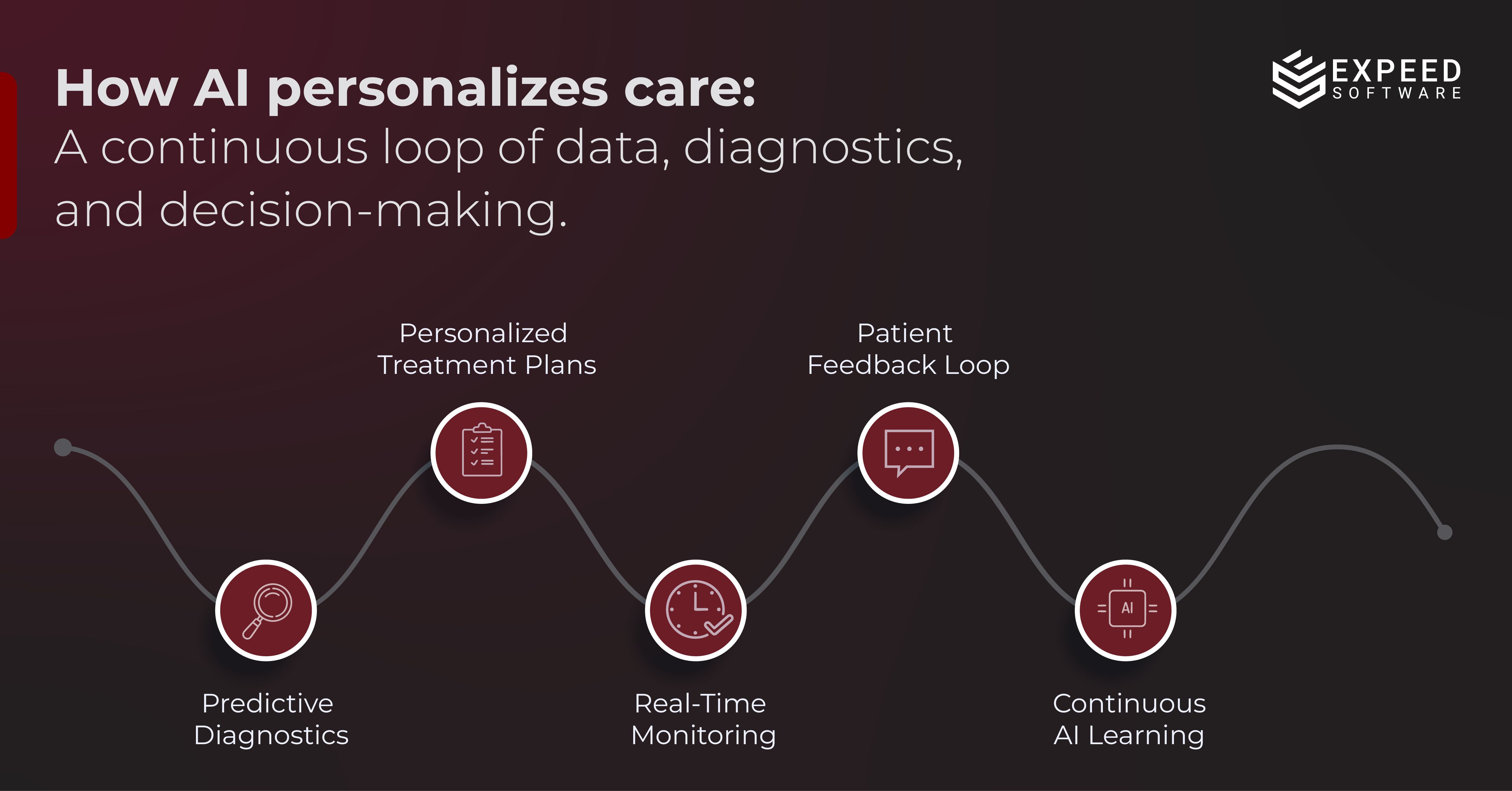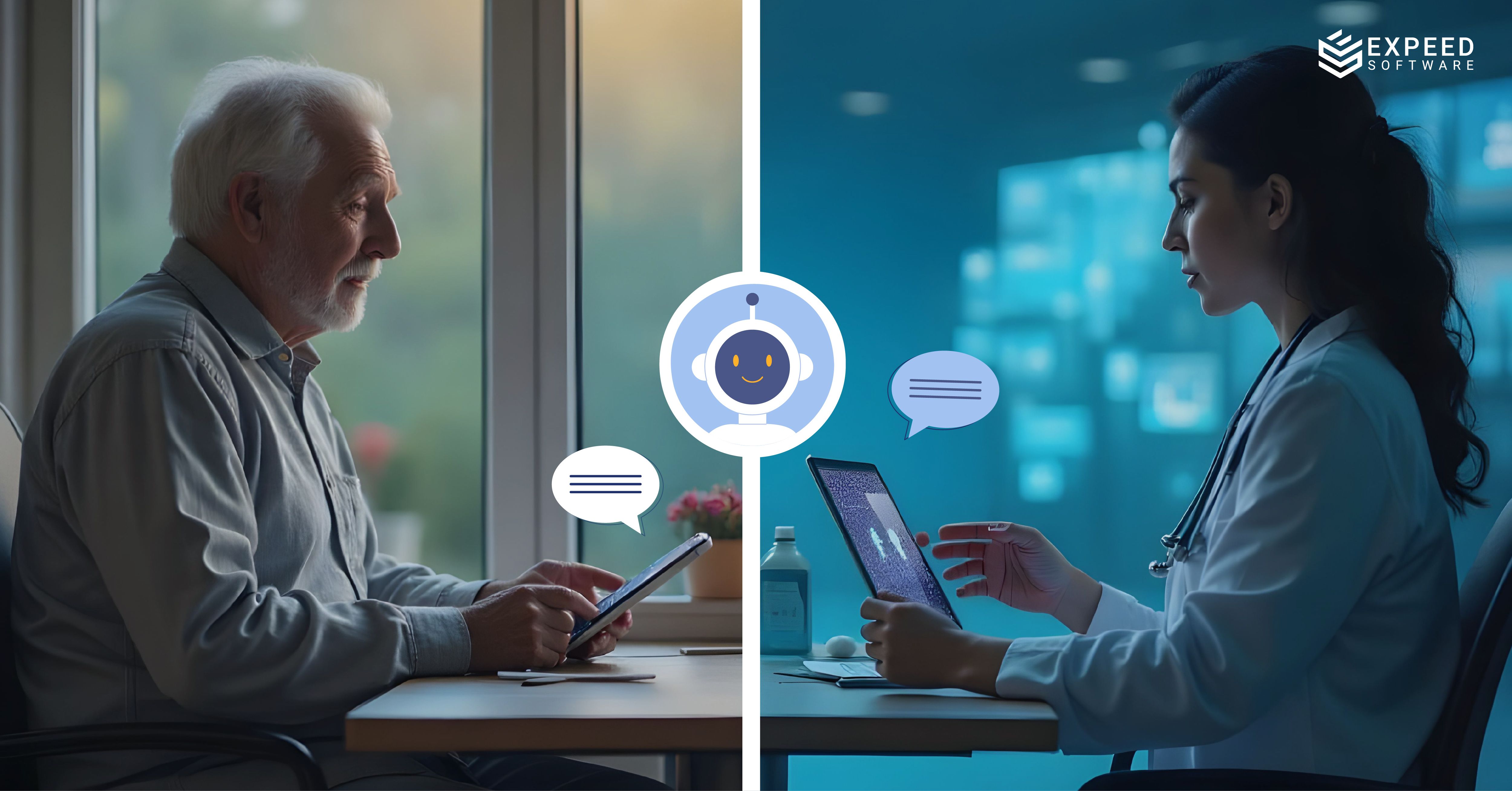Long wait times. Endless forms. Rushed appointments. Sound familiar? Healthcare has long been bogged down by inefficiencies, but a transformation is underway. And the core of this transformation is AI in healthcare.
Whether it is predictive diagnostics or custom plans for treatment, AI is revolutionizing patient experience step by step. Have you realized how this shift is happening? Let us see how technology is pushing healthcare into its next phase, and solutioning some of the industry’s most persistent challenges.
The Evolution of AI in Healthcare
Earlier, AI in healthcare solutions primarily focused on automating repetitive or routine tasks, like billing, data entry, and scheduling processes. While significant, they were just the beginning of the transformative shift; that is not the case today. AI is no longer just streamlining administrative work in healthcare.
AI has come a long way beyond just automation. Modern AI-driven systems can now understand unstructured medical information, spot anomalies, find unusual patterns, and connect symptoms, behaviour, and genetic factors. Hospitals no longer are just digitizing records; they are training AI to interpret and expound them. This shift from automated to intelligent systems has redefined the scope of AI in healthcare.
A report from Grand View Research says the global AI in healthcare market was worth $26.57 billion in 2024 and is expected to grow to $187.69 billion by 2030, with a growth rate of 38.6% between 2025 and 2030.
As AI gets better at making smart decisions, it's being used in all parts of healthcare, like enhancing diagnosis accuracy, streamlining documentation, supporting chronic care, improving clinical trial recruitment, and reducing operational inefficiencies. In the next sections, we break down how AI is transforming specific facets of care, delivering tangible improvements for both providers and patients.
Personalized Medicine Through AI
- Beyond One-Size-Fits-All Treatments
One of the major advantages of AI in healthcare is personalization. Instead of assuming that every patient with the same symptoms needs the same solution, AI can craft individualized treatment paths that move beyond generalized protocols. This means that two individuals with identical symptoms might receive entirely different treatments, reflecting the unique biological factors influencing their health outcomes.
- Real-Time Treatment Adjustments
What makes AI especially transformative is its capacity to update treatment strategies in real time. As new test results come in or wearable devices capture ongoing vitals, AI quickly re-evaluates the treatment plan. It alerts doctors to any issues and suggests timely modifications. This kind of responsive care helps doctors adjust faster and keep patients safer.
Role of Generative AI in Healthcare
- Automating Clinician Workflows
By leveraging generative AI in healthcare, clinicians are getting much-needed relief from time-consuming documentation. Physicians now rely on AI to generate case summaries, identify risk factors, and pinpoint relevant clinical trials—all personalized for each patient. What once took hours now takes minutes, helping doctors focus more on decisions and less on paperwork.

- Training Models for Rare Conditions
Generative models are playing a key role in clinician education. Through simulated case studies and synthesized knowledge from research literature, AI tools serve as intelligent learning aids. They equip healthcare providers with deeper insights and better preparedness, improving diagnostic accuracy and preparedness in complex, real-world situations.
Predictive AI for Faster, Smarter Diagnoses
- Catching Symptoms Before They Appear
With predictive AI, it’s possible to spot health risks before physical symptoms even surface. AI models scan through EHR data, metrics from wearables, and lab findings to detect early indicators of serious conditions like cancer, cardiovascular disease, and diabetes. Used alongside physicians, these technologies support earlier, more proactive interventions.
- Clinical Decision Support Systems (CDSS)
CDSS powered by AI act as valuable second opinions for healthcare providers. These systems compare a patient’s records with insights from thousands of past cases to suggest probable diagnoses and treatment paths. This intelligent support significantly reduces diagnostic errors and plays a critical role in driving better outcomes for patients across various specialties.
Virtual Health Assistants Redefining Access
- Breaking Down Communication Barriers
Chatbots and virtual voice assistants are reshaping how patients access and interact with healthcare services. These AI-powered tools provide 24/7 support for different tasks, including scheduling appointments, understanding medications, and sending follow-up notifications or reminders. These assistants help deliver live, tailored responses, ensuring patients are supported even outside the clinic.
- Reducing Gaps in Rural Healthcare
AI tools are becoming really important in rural healthcare, where there are provider shortages. These tools can help patients check symptoms, manage follow-up schedules, and provide critical triage, all in real time. They connect rural clinics to big health records systems, which makes diagnoses more accurate and helps people in remote areas get the care they need.

Remote Monitoring and Chronic Care Management
- Keeping a Pulse on Patient Health
The rise of smartwatches, heart monitors, and glucose sensors has created a stream of patient data. But this data is only as useful as the insights it offers. AI in the healthcare industry helps clinicians monitor this data continuously and detect concerning patterns early. If a patient’s blood pressure goes up suddenly or their oxygen level drops, AI systems can let the care team know right away.
- Improving Long-Term Patient Engagement
AI extends its value into long-term care by helping patients manage chronic illnesses more effectively. For patients living with illnesses like asthma or diabetes, AI-powered systems send timely, personalized prompts to take medication, track nutrition, or log symptoms. This helps patients take ownership of their health and fosters stronger collaboration between patients and providers.
Accelerating Research and Drug Discovery
- Faster Drug Development Cycles
Medical research, long a slow-moving field, is now speeding up under the palms of AI. Machine learning models sift through thousands of research papers, clinical trial data, and historical case studies to identify trends and opportunities. Pharmaceutical companies use AI to simulate molecular reactions, reducing the time and cost required to discover viable new drugs. What once took years can now take months, drastically improving the pace of innovation.
- Better Patient Recruitment for Trials
AI also optimizes patient screening for clinical trials. In place of screening hundreds or thousands of records by hand, AI handles the heavy lifting. It quickly scans data on age, health history, and genetic markers to identify suitable participants. This accelerates trial timelines, improves study accuracy, and ensures that more diverse populations are represented.
How Is AI Used in Healthcare Infrastructure?
While much attention goes to patient-facing innovations, backend hospital operations have also been revolutionized. AI systems forecast emergency room traffic, optimize shift planning, and streamline supply chains. Predictive tools even help hospitals decide when to reschedule elective surgeries based on expected bed availability. Hospitals can come across frequent challenges like missing supplies, unused beds, and overstocked equipment.
AI tools can monitor resource utilization patterns and accurately predict procurement levels. This smart forecasting minimizes waste, prevents shortages, and keeps patient care at a high level.
Ethics, Bias, and the Road to Responsible AI
With great innovation comes great responsibility. How is AI used in healthcare without compromising patient trust? Issues like algorithmic bias, data privacy, and lack of transparency remain key concerns. A poorly trained model can deliver biased outcomes if its data lacks diversity. Developers must consciously design AI systems that are trained on representative datasets across ethnicity, gender, and age. Healthcare decisions impact lives. That means every AI recommendation must be traceable and explainable.
Explainable AI (XAI) models make it easier for doctors and patients to understand why a certain suggestion was made, increasing confidence in the system. This transparency is essential to building a culture of trust in AI-assisted healthcare.
Shaping the Future of Patient-Centered Care with AI
The growth of AI in healthcare is having a real effect, and it's not just a temporary trend. It's making the system smarter, quicker, and easier for everyone to use. From generative AI streamlining documentation to predictive tools transforming chronic care, the technology’s reach is growing rapidly.
But this shift doesn’t happen by itself. Hospitals, clinics, and other healthcare entities need AI solutions that match their daily routines, the way they operate, and the people they serve.
At Expeed Software, we create AI solutions that match the specific requirements of healthcare providers. From building custom generative AI models and natural language processing to designing workflow-specific tools, predictive analytics, computer vision, and intelligent automation, our cross-functional teams blend healthcare insight with deep tech expertise to solve real-world clinical and operational challenges. That way, they can focus on what really matters: caring for people with the help of smart technology.

